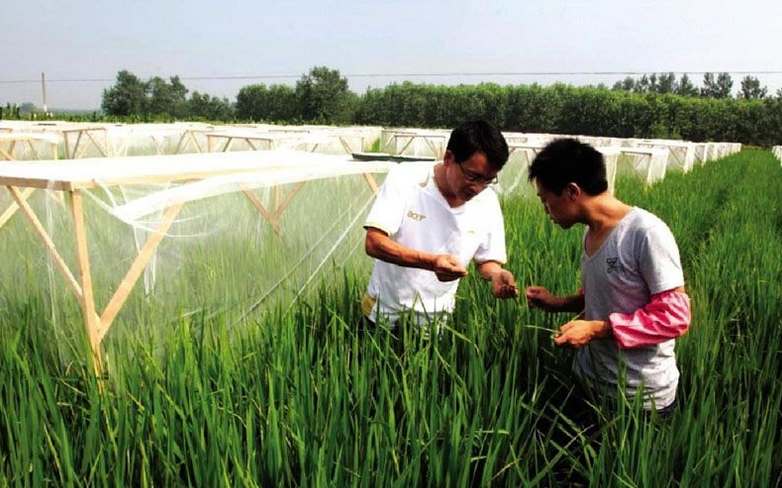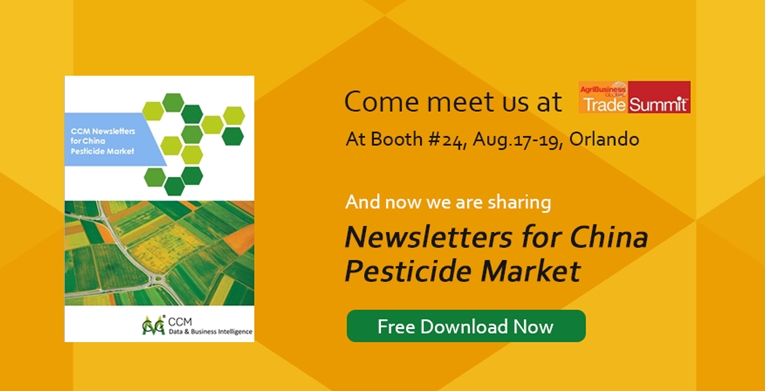It is easy to cause pollution during the
production of pesticide technical. Compared with technical, pesticide
formulations, a further-process product from technical with higher technology and
added values, pollute the environment less.

Source: Baidu
Currently, Chinese pesticide enterprises
are still competitive in producing pesticide technical; however, almost all the
pesticide products required advanced technology are manufactured by foreign pesticide
giants.
Dilemma:
Too many low-end products but few high-end pesticides
China is the biggest consumer of pesticide
in the world. Over 1.4 million tonnes of pesticide are used in China every
year. According to China’s Ministry of Agriculture (MOA), among the pesticides,
most of them are chemical pesticides which accounts for one third of the total
use of chemical pesticide globally. In China, fifteen kilogram of pesticide
would be applied in one hectare of fields, twice more than the usage in
developed countries.
In fact, the unreasonable and over use of
pesticide in China is caused by the lack of niche products and crop protection technology,
according to analyst CCM.
As the biggest pesticide producer in the
world, it seems that China never runs out of pesticides. In 2015, 2,232 Chinese
pesticide manufacturers registered at least 34,000 products, according to
Institute Control of Agrochemicals, Ministry of Agriculture (ICAMA).
However, homogeneity among all the products
is a problem that cannot be neglected. According to ICAMA, there are up to
1,047 registered products contained glyphosate and even 123 registrations of pyraclostrobin
products with its patent just expiring for a year. That almost all the
pesticide enterprises producing one specific product at the same time has led
to intense competitions among the same product and overcapacity in the industry.
Some of the products became non-profitable after the vicious competitions. For
instance, the average ex-works price of 95% glufosinate-ammonium TC fell to
USD19,488/t in the first half of June 2016, down more than 50% compared to the
average price in 2015.
Though there are too many products of
staple pesticide in China, there is few pesticide for controlling some unusual
diseases and insect pests. With some highly toxic pesticides being banned and
limited in China, it would be more difficult for farmers to prevent and control
diseases especially on nematodiasis, bacteriosis, virus diseases, drug-resistant
pests and weeds.
Due to considerations of pesticide cost, lack
of niche pesticides and crop protection knowledge and skills in China, some
farmers are still using illegal pesticide, which causes the unreasonable use of
pesticide in China.
To
break through dilemma
In order to improve the efficacy in China
pesticide industry, some Chinese pesticide enterprises have already devoted themselves
to developing niche pesticides and focused on the service of pesticide spraying
for farmers.
Qingdao Hailir Pesticides & Chemicals
Co., Ltd. (Qingdao Hailir), one of the earliest pesticide enterprises in self
R&D in China, invested a lot on its pesticide development. Relying on its
advanced technical technology, Qingdao Hailir has a whole product series
covering acaricide, insecticide, fungicide, herbicide and crop nutrients and
provides farmers with a package of service in controlling and preventing
diseases in cultivation. Besides the non-patent pesticides, Qingdao Hailir has
even developed some new compound chemicals with independent intellectual
property rights, which are in the process of registration.
Besides the innovation of pesticide
products, the development on crop protection equipment also matters.
Due to the shortage of labor in the countryside
and hard condition in applying pesticides, it has become a big problem for
large growers to find people to apply pesticides in peak season. The
development of crop protection drones has helped farmers to better cultivate.
Relying on its efficient crop protection
equipment and technology, Guangxi Tianyuan Biochemistry Co., Ltd. (Guangxi
Tianyuan) has formed a crew to spray pesticide for the farmers, changing from “selling
pesticide to farmers” into “spraying pesticide for farmers”.
Modern efficient crop protection equipment
is the main method to improve the crop protection service, said Li Weiguo, CEO
of Guangxi Tianyuan. In the USA, there are about 10,000 companies which provide
crop protection service, with the total sales value of USD7 billion annually.
The crop protection companies purchase
pesticides directly from manufacturers and dealers, then offers technical
service for the farmers in pesticides spraying. These sucessful cases in the
USA could be really learnt from, said Li.

Merger
and acquisition: to improve the industry concentration
In 2015, the sales value of top 10 Chinese
pesticide enterprises accounted for 10% of the total sales value in China and
that of the top 20 captured 15.6%, while the sales value of top 6 multinational
agrochemical corporations, including Bayer, DuPont, BASF, Monsanto, Syngenta
and Dow AgroSciences, captured 76.5% of that in the world, according to analyst
CCM.
With too many small-scale pesticide
producers in China, the China pesticide industry is with low industry
concentration. Without a giant as a leader, China’s pesticide industry is far
away from competitive. Thus, forming a large-scale pesticide corporation in
China is vital to improve the industry competitiveness.
When talking about the future of China
pesticide industry, Zhang Wei, president of Fuhua Tongda Agro-chemical
Technology Co., Ltd., stated: “Acquisition and merger is a way to save the
agrochemical industry in China.”
“It has been hard for the agrochemical
industry both at home and abroad in these two years. The price of glyphosate
fell 40% in 2015. If everyone still expects the price rise for glyphosate like
2008 and 2012, and keeps expanding their capacity on the same product, the
whole industry would be in much trouble.”
“At the end of 2015, two global agrochemical
giants - DuPont and Dow AgroSciences announced to combine. They are hoping that
after the integration of their products and sales channels, their combination
would help them perform better in the market.”
“Earlier, ChemChina taking over Syngenta
with a huge amount of money actually gives a signal to the pesticide industry –
acquisition and merger helps enterprises to survive in the bleak agrochemicals
market,” said Zhang.
To
tackle environmental issues
In the past two years, the Chinese
government pays more and more attention on environmental pollution and food
safety. To tackle the pollution from the pesticide productions, the Chinese
government has released environment protection laws and regulations and
emission standards on air, water and solid waste, which has given a lot of
pressure on all the Chinese pesticide enterprises.
On 21 May, Shenzhen Noposion Agrochemicals
Co., Ltd. announced that its subsidiary - Jiangsu Changlong Agrochemicals Co.,
Ltd. was sued by two environment organizations, including Friends of Nature Environmental
Institute in Chaoyang Beijing and China Biodiversity Conservation and Green
Development Foundation, because of its environmental pollution.
“Environmental issue cannot be avoided in
the agrochemicals industry,” said Li Zhonghua, secretary general of China Crop
Protection Industry Association (CCPIA).
“Strict environmental measures in China
could help eliminate the inefficient capacity and small-scale enterprises.”
The production of pesticide is different
from other productions. Emissions from some enterprises are highly toxic with complicate
contents. For example, some chemicals contained phosphorus, benzene, phenol and mercury are difficult and expensive to deal with.
In addition, a pesticide enterprise would
produce various kinds of pesticides in a year and producing different
pesticides emit different pollutions, which makes it harder to deal with the
wastes.
Currently, most of the environmental
protection companies provide only chemical enterprises but few pesticide
producers with service on dealing with wastes, which is also a problem to be
faced by the pesticide producers in environmental protection.
*CCM
is attending AgriBusiness Global Trade Summit at Booth#24 in August 17-19 in Orlando,
Florida, U.S.A. To better prepare for the Trade Summit, CCM is presenting a
series of feature reports of China agrochemical market. And now, you could click here to download a free
sample of Newsletter
for China Pesticide Market to know the latest news in the
China’s market.

About CCM:
CCM is the leading market intelligence
provider for China’s agriculture, chemicals, food & ingredients and life
science markets. Founded in 2001, CCM offers a range of data and content
solutions, from price and trade data to industry newsletters and customized
market research reports. Our clients include Monsanto, DuPont, Shell, Bayer,
and Syngenta. CCM is a brand of Kcomber Inc.
For more information about CCM, please
visit www.cnchemicals.com or get in
touch with us directly by emailing econtact@cnchemicals.com or calling +86-20-37616606.